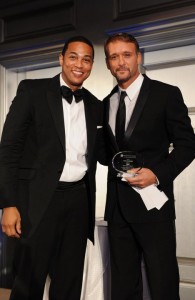Raquel Arantes: Um sonho não pode ser roubado
July 22, 2013

Há alguns meses atrás, a artista brasileira Raquel Arantes, minha sogra, estava se preparava para sua primeira exposição de esculturas. Apesar de viver em Belo Horizonte, Arantes elaborou grande parte de seu trabalho em São Paulo, sob a tutela do proeminente artista brasileiro Cícero D’avila. Durante uma ida a São Paulo, para buscar trabalhos que estavam em seus estágios finais e trazê-los para Belo Horizonte, tendo em vista a exposição, Arantes se viu vítima de um crime que arrasaria muitos artistas.
Ao terminar de colocar as esculturas em seu carro, um homem armado apareceu. O ladrão levou o carro e seu conteúdo, ambos nunca mais localizados.
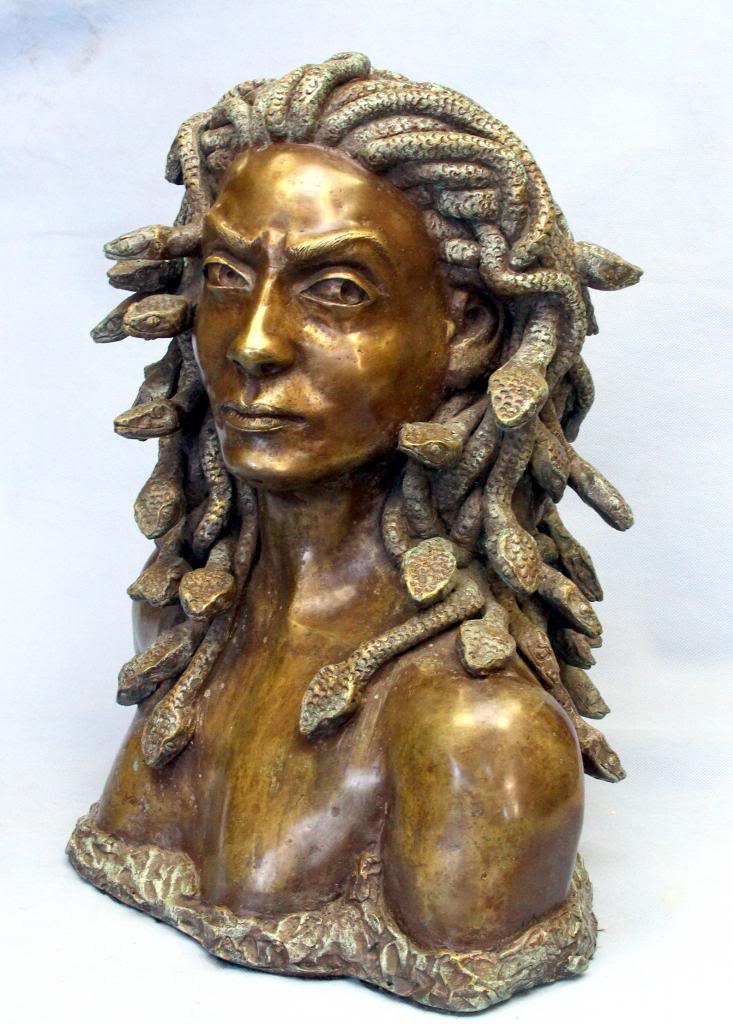
É claro que fiquei extremamente triste e revoltada porque senti tão impotente naquele momento em que vi uma arma apontada para mim, me obrigando a deixar para traz um trabalho que eu tinha me dedicado tanto e com tanto amor!” disse Arantes.
“A gente não esquece o ocorrido, mas faço um trabalho mental para superar essa tristeza e essa raiva,” disse Arantes, 62.
Assim, com pouco tempo para lamentar suas esculturas roubadas, Arantes voltou ao trabalho e recriou as peças roubadas. Suas obras já estão prontas para a exposição, que começa no dia 25 de julho, no Museu Inimá de Paula, em Belo Horizonte, Minas Gerais, Brasil.
“Como meu marido Gilson disse, eles levaram o que eu construí, mas eles não levaram a minha capacidade de construir algo novamente”, disse Arantes. “Assim, foi com esse espírito que eu trabalhei para superar o que perdi.”
Por sua vez, D’avila - que admitiu não estar ciente que Raquel tem 62 anos - ficou impressionado com sua dedicação para recriar seu trabalho.
“Notavel a sua determinacao em suplementar a perda de sua escultura que ja estava pronta para ser fundida em bronze. Vejo que para isso ela estava bem focada no seu objetivo, tendo portanto superado este grande trauma que veio em um momento muito delicado: a preparacao de suas obras para a exposicao, confrontada ao reduzido tempo que restava,” disse D’avila.
A Arte, de uma forma ou de outra, sempre foi uma parte da vida de Raquel. Mas apenas mais tarde, com os filhos já crescidos, ela pode se dedicar, com mais intensidade, a diversos trabalhos artísticos, experimentando com uma grande variedade de materiais, antes de se apaixonar por esculturas.
“Eu me destacava nas aulas de artesanato na escola e esta habilidade se desenvolveu ao longo dos anos”, disse Arantes, que quando adolescente fazia bonecas de pano e outras coisas dentro de um orçamento apertado.
“Quando adulta, comecei a trabalhar com diversos materiais, tecidos, couro, madeira, etc”, disse Arantes. “Mais tarde, quando tive mais tempo, comecei a pintar porcelana e, em seguida, segui para a arte em cerâmica, através da qual eu pude criar peças personalizadas. ”
Mas foi o simples barro que ajudou Arantes a encontrar um meio que funciona perfeitamente para ela.
“Foi um salto descobrir que o que eu mais gosto é criar minhas próprias formas, usando argila”, disse Arantes. “Hoje, eu vejo que amo fazer esculturas de formas e estilos diferentes.”
D’avila - que é o mentor de Arantes e a ajudou a aprender técnicas específicas - está em êxtase com o crescimento continuado de sua protegê, bem como seu compromisso com o ofício.
“Acho que melhorou muito. Alem do seu inegavel talento, ela demonstra muita determinacao, pois faz um sacrificio imenso se deslocando de BH para SP todas as vezes que tem aulas. O seu trabalho, hoje, é o melhor testemunho disso,” disse D’avila.
Arantes - que também agradeceu a sua família, D’avila e amigos, como Nestor de Oliveira e Marcus Aurelius por seu apoio e ajuda - revela que há alguém especial que é a inspiração para sua primeira Mostra.
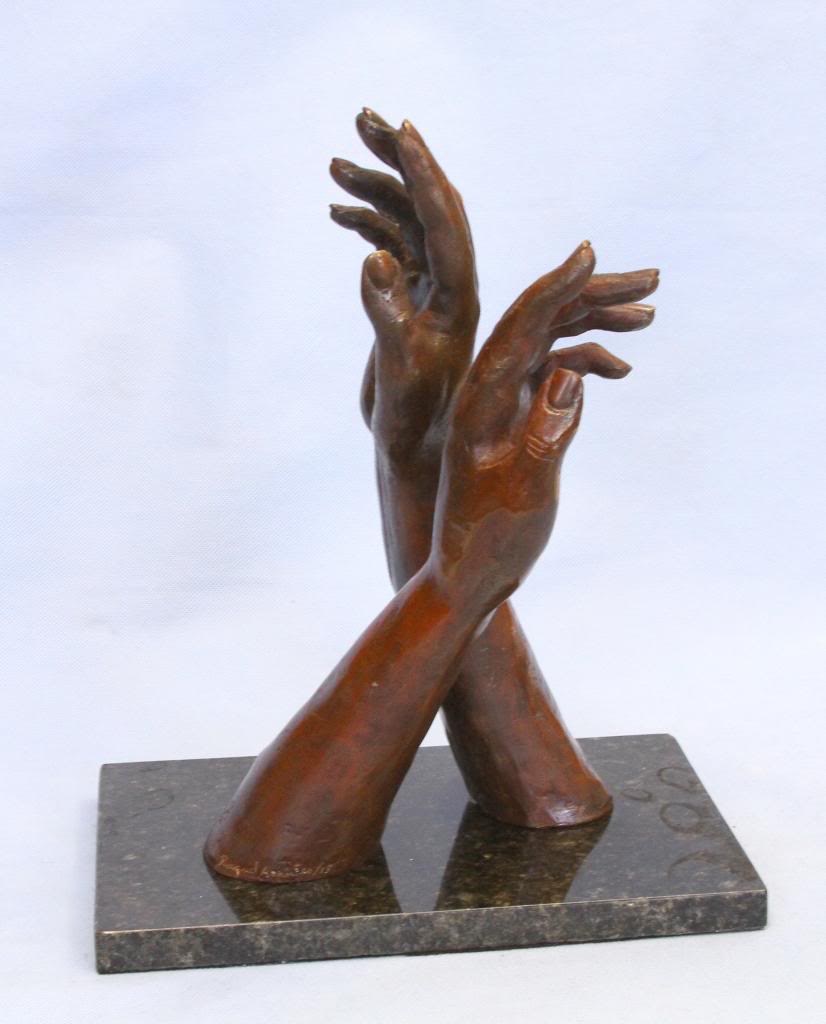
O nome da exposição é “Albernaz” (seu nome de solteira) e dedico este evento ao meu pai, que teria um orgulho imenso ver o meu trabalho, porque como eu, ele era extremamente hábil e fez coisas incríveis com suas próprias mãos. ”
Afinal, o que poderia ter sido um grande obstáculo, transformou-se em um triunfo para Arantes, pois ela acredita que seu trabalho, após o roubo, está ainda melhor.
“Cada peça é única. Fiz as novas esculturas pensando no que foi tomada, mas cada peça tem pequenos detalhes que diferem um do outro tornando-os únicos.
“Eu acho que cada peça que faço acrescenta algo de novo, e vejo que evolui ao longo do tempo”, disse Raquel.
-WKW
Raquel Arantes: A Dream Can Not Be Stolen
July 19, 2013

A few months back, Brazilian artist Raquel Arantes - who, for full disclosure is my mother-in-law - was preparing for her first exhibition as a sculptor. Despite living in Belo Horizonte, Arantes did a great deal of her work in Sao Paulo under the tutelage of prominent Brazilian artist Cicero D’avila. While in São Paulo collecting work that was in its finishing stages to bring it to Belo Horizonte for the exhibit, Arantes found herself the victim of a crime that would crush many an artist.
As she finished loading the sculptures into her car, a man showed up. With a gun. He pointed the gun at her and stole the car - which contained several key pieces. The thief, car and art were never located.
 “I was extremely sad and angry because I felt so helpless at that moment I saw a gun pointed at me, forcing me to leave behind a job that I had devoted so much and with so much love,” said Arantes, 62. “I’ve had to do mental work to overcome the sadness and the anger.”
“I was extremely sad and angry because I felt so helpless at that moment I saw a gun pointed at me, forcing me to leave behind a job that I had devoted so much and with so much love,” said Arantes, 62. “I’ve had to do mental work to overcome the sadness and the anger.”
So with little time to grieve her stolen sculptures, Arantes settled in and recreated the stolen pieces. her work is now ready for the exhibit, which begins on July 25 at Museu Inimá de Paula in belo Horizonte, Minas Gerais, Brazil.
“As my husband said, they took what I built but they cannot take away my ability to build it again,” said Arantes. “So it is in that spirit that I worked to overcome what I lost.”
For his part, D’avila - who admitted to not being aware Arantes was 62 - was impressed with her dedication to recreating her work.
“Her determination in supplementing this loss was remarkable,” said D’avila. “She was tightly focused on her goal and was therefore able to overcome this great trauma, in a limited amount of time.”
Art was always a part of Arantes’ life in one way or another, but with her three children grown, she was able to work with a wide array of materials before she fell in love with sculpting.
“I excelled in school crafts and this skill has been growing over the years,” said Arantes, who as a young girl would make rag dolls and other things on a shoestring budget.
“As an adult, I began to work in diverse fabrics, leather, wood, etc.,” said Arantes. Later, as I had more time I worked, I began to paint porcelain and then went to ceramic art where I could create more doing more custom parts.”
But it was simple clay that helped Arantes find a medium tat worked perfectly for her.
“It was a leap for me to find that what I liked most was to create my own forms using clay and then making sculptures,” said Arantes. “Today I see that love making sculptures of different ways and styles.
D’avila - who has been mentoring Arantes and helped her learn specific techniques - is ecstatic over his protege’s continued growth as an artist, as well as her commitment to the craft.
 “She has improved a lot,” said D’avila. ” Besides her undeniable talent, she shows a lot of determination, and has made the huge sacrifice of traveling from Belo Horionte to São Paulo for classes. Her work today is the best witness to that.”
“She has improved a lot,” said D’avila. ” Besides her undeniable talent, she shows a lot of determination, and has made the huge sacrifice of traveling from Belo Horionte to São Paulo for classes. Her work today is the best witness to that.”
Arantes - who also thanked her family, D’avila and friends such as Nestor de Oliveira and Marco Aurélio for their support and help - said there is someone special to her who is the inspiration for her first exhibit.ate
The name of the exhibit is “Albernaz” (her maiden name) and I dedicate this event to my father who would have an immense pride to see that my work, because like me, he was extremely skillful and did amazing things with his hands.”
In the end, what could have been a major roadblock turned into a triumph for Arantes, who feels her work after the robbery has been even better.
“Each piece is unique. I made the new sculptures thinking of what was taken, but each piece has small details that differ from one another making them unique.
“I think every piece I do adds something new and I see that evolving over time,” said Arantes.
-WKW
Daily Chronicling Sept. 26, 2012
September 26, 2012
Mitt Romney is going to start getting tough and not pull any punches. This means he will lose by 12.
—-
Iran’s Mahmoud Ahadinejad calls for a new world order. In other news, he should be dead soon.
—-
A guy who helped torture and kill Gadhafi has now been tortured and killed. Libya’s really catching on to democracy.
—-
The NFL has already tainted its season by using replacement referees. Let’s see if they can go a few more weeks and destroy the whole thing.
—-
Hey, look! Madonna got herself in the news. Who could have seen that coming?
-WKW
Men Stopping Violence: Getting men to join the struggle to end violence against women
November 22, 2011
 Acts of violence by men against women do not begin with the act of violence itself. But whether it be upbringing or societal factors, there is always one factor that remains the same in every act of male violence against woman – the presence of a man willing to commit said act of violence.
Acts of violence by men against women do not begin with the act of violence itself. But whether it be upbringing or societal factors, there is always one factor that remains the same in every act of male violence against woman – the presence of a man willing to commit said act of violence.
It’s these men that the organization Men Stopping Violence is attempting to reach. Its Mission Statement - “To mobilize men to use their many strengths for creating a society free from violence against women.” Created in 1982, Men Stopping Violence has used a plethora of techniques and programs to get men into the conversation about violence against women, and has had success in changing the dialog.
“We believe that we have played an important role in helping people understand that if we are going to END violence against women, we must engage men in this work,” said Men Stopping Violence Executive Director Shelley Serdahely in an e-mail exchange.
While other organizations have taken a similar concept in dealing with violence against women, it is the methods and strength of MSV that has made it stand out as an organization that is making real strides in the effort to change cultural and community attitudes toward violence against women. MSV programs include:
Because We Have Daughters: “Why would men want to get involved in ending violence against women?” The answer: “because they have daughters.” And Mothers and sisters and friends. This Father-and-daughter class teaches fathers about the risks and realities faced by their daughters.
Tactics and Choices: In conjunction with the DeKalb County Magistrate Court, this twice-monthly class for some men who have been arrested for domestic violence offenses examines men’s use of abusive and intimidating tactics against women, and tactics used to enforce and maintain power and control. The use of videos and other educational materials prompt men to engage in a dialogue that explores their behavioral choices.
Community Restoration Program: The group’s original intent was to offer men who had finished the 24-week program an ongoing connection and support and opportunities to volunteer with MSV. Over the years, the role of CRP has expanded to include more direct community advocacy.
Serdahely said that while the essential mission of the organization remains the same, MSV’s techniques and focus have evolved over the years.
“When MSV began, we conducted classes for men who had been identified as abusive or violent. That was intervention work. Thirty years later, almost all our work is prevention work,” said Serdahely. “We continue to provide the classes, but have incorporated modules in the curriculum that require students to share something they have learned in the class with at least four men in their community.”
The efforts of MSV have transcended borders. CNN Headline News Anchor Richelle Carey – who works with MSV as a VP on its Board of directors and tireless advocate – said she has been thrilled to see the message of MSV go worldwide.
“Moses Okoth, a Kenyan, is working to end violence against women while collaborating with us, said Carey in an e-mail exchange. “He embraces - in fact - embodies our mission and our philosophy that men must play a role in creating safe communities for women and girls. He wants to start MSV classes where he lives and other parts of Africa. We speak with him weekly and are in constant contact with him online.”
Other well-known figures that have worked with MSV include Congressman John Lewis, Lynn Rosenthal, Special Advisor to the President on Violence Against Women, Baroness Scotland, former Attorney General of Great Britain and Dr. Johnnetta Cole.
But while Serdahely - who will soon be leaving her position to devote her time to fundraising efforts for MSV - and MSV have truly made strides in educating men about violence against women, the battle remains difficult. Via television, magazines and all other media outlets, the portrayal of women is often one that gives young men a perverted view of women overall.
Men are taught that one of the rewards of manhood is sex on demand and that a female or child is not someone, but something, to be used or possessed by males,” said Serdahely. “Media and advertising play a key role in teaching that lesson by portraying women and girls as sexual objects.
“We challenge men to check the ways they buy in to that portrayal. That is part of the 24 week classes we continue to lead, all the training we conduct for institutions and communities, the Allies group, and the work we do with interns. It will be included in the syllabus for the class we will be teaching at Emory University this spring,” added Serdahely.
Possibilities
What They’re Saying About Men Stopping Violence
“What motivated me to become active were the comments and conversation surrounding Chris Brown’s assault on Rhianna. I was so disturbed by some viewer comments and comments from people I knew who implied she somehow played a role in being beaten. I was especially sad to hear young people describe it as “just fighting.” At that moment I knew I had to do something. I didn’t grow up around domestic violence, but it was clear to me then that it’s not the other person’s problem. It’s everyone’s problem and everyone’s responsibility to end violence against women.”
- HLN News Anchor Richelle Carey
“I gained a greater appreciation for the challenges associated with men being involved with the fight against violence against women. I began to value the role of women as leaders in this effort, and I learned a whole lot about patriarchal society and how it informs our views and actions.”
– Ronald McClain, President and CEO of Family Services of Greater New Orleans. Attended the MSV training institute, “Closing the Gap.”
My name is Richard C. Brown Sr., Clayton County, Associate Magistrate Court Judge. I had the opportunity to participate in one of your Domestic Violence Classes at the Dekalb County Courthouse on Friday, November 5, 2010. Simply stated, It was excellent!!! I would go so far as to say that it was the most powerful display of human interaction and transformation that I have ever witnessed, within such a limited and short period of time. I have been in the Criminal Justice field for over 35 years and I have seen it all while serving as a City of Atlanta, crime scene clerk, technician, corrections officer, sergeant and lieutenant, internal affairs prosecutor and assistant public defender.
- The above was written about the MSV class, Tactics and Choices
If men are going to be part of the process of ending violence against women, it requires knowledge of ourselves and the part we play. As men engaged in this task, we take the important step of asking ourselves tough questions that take a lot of courage to answer candidly. It isn’t always pretty, but when you come through it, it allows you to reach out to other men and help them make lasting positive changes.
– Jeremy Coppels
Get Involved
Founding Executive Director Kathleen Carlin once said that “Hope isn’t about believing we can change things. Hope is about believing what we do matters.” If you are interested in getting involved with Men Stopping Violence or helping them continue their work, you can:
- Donate to support the programs of MSV.
- Request training for your organization or community.
- Take a stand on a current issue.
- Attend a MSV event.
- Share what we do with colleagues and friends.
- Volunteer your time and talents.
- View our brochures, including What You Can Say and Do to Make a Difference.
For more information, contact Men Stopping Violence here.
On Twitter: @MenStopViolence
On Facebook: Men Stopping Violence
-WKW
Thanks, Marcelo
June 27, 2011
Note: Will Kohl over at Back2Stonewall asked me if I’d write him a guest post about some of my experiences in Brazil. Here is that post, originally posted at Back2Stonewall.com
I can’t remember a time when I wasn’t Gay friendly. But it took coming to Brazil for me to become a full-fledged Gay ally. That change started almost immediately upon my arrival.
Marcelo - my Brother-in-law - is a Gay Brazilian male. I was one of the few that knew this about him almost 10 years ago, when even he struggled admitting it to my wife and her sisters - his closest allies.
Marcelo didn’t fully come out of the closet until a year ago. He had been trapped there by his fears for 30 years. His coming out was met with love, acceptance and hugs. As he said afterward, “It was like farting in the ocean.”
Grupo Gay da Bahia, the oldest gay advocacy group in Brazil, published yesterday their yearly report on violent deaths of gay people in Brazil. According to the report, the number of people who are murdered because they are gay is up, 198 murders in 2009, compared to 189 in 2008.Brazil leads the world in homosexual victims of murders. Mexico comes second (35 deaths) followed by the United States (25 deaths), according to the GGB.
Among the murdered, 117 were gay men (59%), 72 were transsexuals (37%) and 9 were lesbians (4%). Most of the crimes go unpunished (more than 90%).
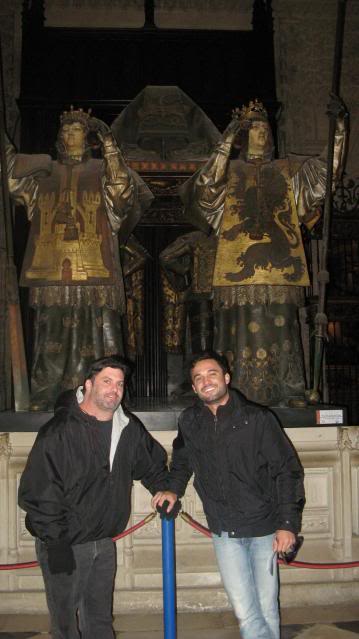
It has been a joy watching Marcelo become the man he was always supposed to be this past year. With a cadre of Gay friends, he has gone from hiding and sneaking, to being open and proud. Not long ago, I asked him a question, only to be ignored as he was lost in Facebook conversation (he quickly learned and joined the Gay communities that permeate social media.)
“Marcelo,” I said, jokingly imitating the show Intervention. “Your Gayness is affecting me negatively in the following ways: You just ignored me.”
We laughed, knowing that just over a year ago, that joke could never have been made within earshot of others.
“It’s not that a homosexual can’t play ball. If he wants, than play it. However, form his own team and start another federation. Schedule games with those that prefer to fight against themselves.”
“By the way, this popular saying is very precise: Each one in their own area, each monkey in their own branch, each rooster in their own coop, each king in their own deck of cards.
That is what I think, and because I think like this, in the condition of a judge, I say it!”
- Brazilian Judge Manoel Maximiniano Junqueira Filho, in throwing out a defamation of character lawsuit filed by soccer player Richarlyson.
It has not just been Marcelo who has shown me the courage of being an openly Gay male in Brazil. In fact, the majority of my male friends in Brazil are openly Gay.
There is Paulino, a friend of my wife and her family for years. His life in Sao Paulo, where he is a well-regarded nutritionist. He told me of his first Gay experience, when his retainer kept falling falling out of his mouth.
“This is your first time, isn’t it?” His first partner kindly asked.
There is the flamboyant and wonderful Pedro - a successful businessman. Having never really spoken with a Gay male about how he learned he was Gay, I asked.
“All my fantasies were about men when I was young,”he said. “I thought it was a fetish or something. But then realized that’s all I fantasized about.”
My wife, sitting next to me, gave me a nudge, “You don’t have to talk only about Gay things, you know.”
Brazil’s 11-member Supreme Court decided that those in same-sex civil unions will have the same rights as heterosexual married couples.
The move is a landmark achievement for Brazil - a nation that has struggled with violence against the gay and lesbian community. That move also is a stellar achievement for new President Dilma Rousseff, who had her top prosecutor, Attorney General Roberto Gurgel fight for the verdict.
“Homosexuality is a (the way people are), not a crime. So why can’t homosexuals have families? What has been preventing this is two things the Constitution finds abominable - intolerance and prejudice,” said Judge Luis Fux.
Brazil is often paradoxical when it comes to the Gay and Lesbian Community. There is an ingrained homophobia in many Brazilians, a homophobia stoked by the Catholic Church.
But it’s also a country that holds tightly to civil liberties. This was a nation under a military dictatorship not long ago, and this is something still in the minds of politicians and many Brazilians. There is a belief that the rights of all are of the utmost importance, and that belief has led to impressive actions.
Still, the horrifying specter of violence against Gay males is always hovering in my mind. I have fears for Marcelo, Paulino, Pedro and my other Gay friends. But they have chosen to live freely and openly, and if they are afraid, they don’t show it to me.
There is an incredible LGBT community in Brazil. It is based on Pride and determination. And they have seen their hard work pay off. They will not be defeated. And they will never stop.
This is what being a straight man in Brazil means to me. It is a nation where I became forever connected to the Gay community. It is a nation that has introduced me to some of the best men I’ve ever known. It is a nation where violence against Gay males remains at a horrifying level. It is a nation where I need to do more to be part of the fight.
But in the end, this is for Marcelo. I love you. And I couldn’t be more proud of you. Thank you for sharing so much with me. Thank you for helping my eyes grow wider.
-WKW
Out of the Shell
September 23, 2010
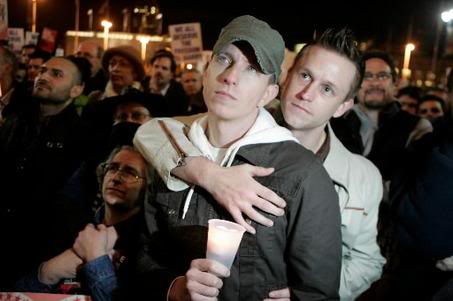
Somewhere sort of like here …
1.
“And this abomination, this insult to Our Lord, it will continue to take us down a path of depravity and immorality that will destroy this great nation. These depraved, perverted individuals must be stopped. This behavior must be eliminated! And it can only happen with the help of God. You are his hands on Earth. You will help to stop this menace before all is lost!”
“Amen!” shouted Pastor Doug’s congregation, as one. But anyone walking by could hear that this response was not a joyous one. Such a holy word, yet such hate emanated from it.
2.
Jeremy starred down at his plate of shrimp. A lifetime of shame flashed through his mind. His stomach seemed to want to leap out of his body sit next to him and taunt him. But Jeremy was also more excited than he’d ever been. He was literally pulsating from head to toe. Was this really going to happen? Was his only true fantasy going to become a reality? He was frozen with anticipation, fear, lust and hunger. He hadn’t eaten since lunch, after all.
“Dude, just eat it. Seriously, it’s going to be Ok,” said Michael.
Michael. Jesus Christ, Michael tempted him. But he made him feel amazing. They had been high-school sweethearts. They were the King & King at the prom, even. And the relationship had somehow grown only stronger in the two years since they graduated. Friends and family were already telling them to “just set the date already.” They were the perfect couple and deeply in love.
The only issue had been Michael’s Shellfish Eating. They were only 15 when Jeremy saw him eat a shrimp for the first time. Raised in a strict Catholic household, he couldn’t even admit his secret desire to gorge to Michael back then. It was too forbidden. It was, as Leviticus had written, an abomination. Even now, at age 20 and as logical as he had ever been, he feared for his very soul.
 He had spent his high school years haranguing Michael with Bible verses, tears, and outright demands that he stop. Luckily, Michael didn’t look like someone that ate shellfish, and didn’t take the harassment that other suspected shellfish eaters took from vicious high school bullies. Jeremy prayed every night for God to rid Michael of his deviant behavior. That the two never came close to breaking up was a testament to their love.
He had spent his high school years haranguing Michael with Bible verses, tears, and outright demands that he stop. Luckily, Michael didn’t look like someone that ate shellfish, and didn’t take the harassment that other suspected shellfish eaters took from vicious high school bullies. Jeremy prayed every night for God to rid Michael of his deviant behavior. That the two never came close to breaking up was a testament to their love.
When they were both 18, Michael came out of the freezer. And it seemed like the more he told people, the more people he wanted to tell. Jeremy was beside himself. How could they get married now? An Abstainer couldn’t marry a Shellfish Eater. But Jeremy could never leave Michael. And finally, a few weeks after Michael had come out, Jeremy told the love of his life that, yes, he had fantasized about eating shellfish. Not that Michael hadn’t figured that out years ago, mind you.
“Jeremy,” Michael said softly but firmly. “It’s time. Let go. It’s not an abomination. Leviticus says homosexuality is an abomination, as well. Does anyone pay that any attention?”
Jeremy chuckled nervously. He was a nervous chuckler. But Michael was right. What difference did it make to anyone? Whose business was it? Who was he hurting?
“No, they don’t,” said Jeremy, looking into his soul mate’s eyes with a smile. “They don’t.”
With that, Jeremy picked up the shrimp and put it to his lips. And then into his mouth. As he chewed he let out a small moan. He had taken his first step toward freedom.
3.
Senator McBride was exhausted. The Shellfish situation was becoming a real problem. It seemed like ever since Ellen Degeneres came out as a Lobster Eater on her Popular TV show, a majority of the general public had decided to follow her. Or at very least, decided they just didn’t care that people consumed shellfish. It made no difference that Ellen’s show was canceled soon after (many felt she had been discriminated against, but the simple fact was that all her shows started to revolve around lobster and it just got sort of repetitive and preachy). A genie had been let out of the bottle and it wasn’t going back in any time soon.
The U.S. had always been a step behind when it came to civil rights. Women and African-Americans had to scrape, claw, protest and shout to get their voices heard and their votes to count. Still, even in 2010 there were sizable gaps in regard to the equality of women and minorities.
As for the Shellfish Eaters (“Shells” as they called themselves and “Eaters” as they were called derogatorily), the past decade had seen remarkable progress in their efforts to gain equality. There had been a cultural shift, as shellfish could now be eaten on TV – Network TV – and no one even blinked an eye. There were even prominent Shells that had come out of the freezer, and were applauded and respected for doing so.
But there was a hollowness to this liberation. Because to the right of all this acceptance was simmering hatred. There were still millions of Americans who not only abstained from Shellfish (Abstainers, they called themselves), but actively despised the Shells and truly wanted them to be eliminated.
Some demanded that Shells work to suppress their desires or pray them away. Some worked day and night to put laws on the books that would not just ban shellfish, but ban Shells themselves. Some just wanted to hurt or even murder Shells. There were scary people in the U.S., and more of them than anyone liked to imagine.
And because of this increasingly loud but increasingly small minority, true civil rights for Shells were still just a dream. Shells that had come out of the freezer couldn’t serve in the military, couldn’t adopt children, couldn’t get married, and were denied an almost incalculable amount of rights that Abstainers received.
“Think of the children,” was the common refrain. It made almost no sense, however. The desire to eat shellfish wasn’t something that could be passed along. You were either a Shell or you weren’t. The need to consume exoskeleton-bearing aquatic invertebrates wasn’t a choice. It was as natural as could be. Even most species of animals were involved in shellfish eating to one extent or another.
Senator McBride understood all of this. But as the Senator from Arizona, one of the nation’s most conservative states, it was his job to ignore it and do whatever he could to mollify his hyper-conservative Christian constituency. It was his job to put his foot on the gut of the Eaters.
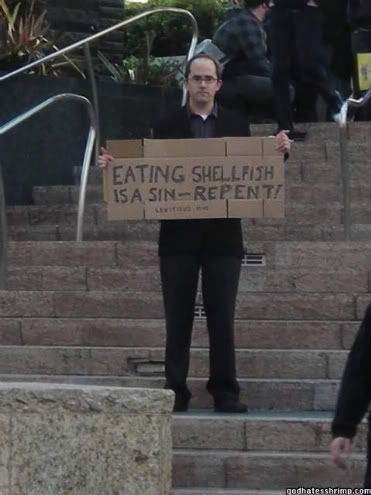 Mind you, the Senator didn’t really care one way or the other. Votes were what mattered, not minorities, women or Shells. But this issue had taken on national significance. The blogs were out of control, screaming for Shell Civil Rights. The right to eat Shellfish – which was still outlawed in 45 states – had become a cause célèbre, with more and more celebrities and those with influence jumping into the water daily.
Mind you, the Senator didn’t really care one way or the other. Votes were what mattered, not minorities, women or Shells. But this issue had taken on national significance. The blogs were out of control, screaming for Shell Civil Rights. The right to eat Shellfish – which was still outlawed in 45 states – had become a cause célèbre, with more and more celebrities and those with influence jumping into the water daily.
While Sen. McBride didn’t hate Shells, he did hate liberals. And liberal bloggers could all be lined up and shot on pay-per-view for all he cared. Actually, he fantasized about that a lot more often than was healthy. So when he stepped up to the Senate podium to give his remarks about a bill that would repeal the U.S. military’s ban on Shells, he concentrated on the Liberals. Screw them.
“My friends, I know the military. I am a proud veteran, and I tell you now that allowing Eaters to openly infiltrate our military will put every last American at risk. I stand firmly against Eaters in the military. Eaters can take the road to Hell if they like, but they will not take this country with them! Not while I’m in this Senate!”
Sen. McBride took a breath and surveyed the Senate. On the right, his Republican colleagues cheered, some even hooted and hollered. To his left, he saw his Democratic foes looking at him with disgust. This. This was what it was all about for the long-time Senator and one-time Presidential candidate. And he was just getting started.
4.
At the exact same moment that Sen. McBride was working to deny Jeremy’s rights as an American citizen, Jeremy was outside of Congress holding a protest sign.
“Shrimp is not a 4-Letter Word: Equal Rights Now!” the sign said. It was just one of hundreds of signs in a peaceful protest rally that had drawn thousands of Shells and Shell Allies. Standing next to his man, Jeremy felt a swell of pride run through his body.
The six months prior to this protest had been the best of his life. After weeks of nibbling on lobster, crayfish, shrimp, oysters and other shelled delicacies in the privacy of their own home, Jeremy could not take it anymore. Things felt so good. So right. He was fulfilled. He was finally free and he wanted to shout it out to the world. And he did. With Michael at his side, he came out of the freezer to his parents.
It went terribly. His mother cried. His father threw them out of the house.
“I did not raise a disgusting eater!” his father screamed at him as they left.
It hurt Jeremy terribly. He had lost his family because of something some idiot had written a billion years ago. He decided to stay in the freezer. That lasted a day. It was too late. He was out now, and there was no going back.
Two week’s later, Jeremy’s father called and asked his son to come visit him. When his father told him that all he wanted was his son, and his eating habits were nothing to him, a weight came off Jeremy’s chest. In time, his entire family not only learned to accept Jeremy as a Shell, but they supported him, as well.
This. This was what it was all about for the long-time frozen Shell. And he was just getting started.
5.
With Sen. McBride’s help, the ban on Shells in the military stayed in place. Shells still could not get married. An employer still could fire a Shell just for being a Shell. Shellophobes were more blatant than ever.
But at that moment, the Senator could care less. He was crying. Actually, he was bawling as he sat in front of Pastor Doug.
“I’m sooooo screwed,” whined Sen. McBride, a small snot bubble forming and popping.
 The Pastor looked down at him. His arrival at the Senator’s home was part of the well-oiled public relations effort to revive McBride’s image after he had been caught throwing down oysters in a Las Vegas motel room. The public was outraged at the hypocrisy.
The Pastor looked down at him. His arrival at the Senator’s home was part of the well-oiled public relations effort to revive McBride’s image after he had been caught throwing down oysters in a Las Vegas motel room. The public was outraged at the hypocrisy.
So the Senator cried. And he cried real tears. Because one of the women he was eating oysters with was actually a liberal blogger. He had been a Shell since he was 12, but was so far in the freezer he had a burn. There had been rumors, of course, but no one dared make such an accusation in public about a war hero. But this Liberal blogger had him dead to rights, and the Internet exploded with the news. The secret video the blogger had taken became the year’s most viewed. Sen. McBride’s secret life as a Shell had gone viral.
“People will forget,” said Pastor Doug, thinking about the money that would pour into his church for his breakthrough performance as the man who saved Sen. McBride’s soul. “Just start focusing on immigration issues and everything will be just fine.”
“Shut Up!” shouted McBride, standing up and taking a deep breath. His re-election chances had taken a mighty blow. The public wanted a True Abstainer, not an Abstainer in name only. He was screwed. And he knew it.
“Fucking liberals!” he shouted at no one in particular.
6.
Jeremy and Michael never heard them coming. Walking down the street, holding hands after enjoying a delicious feast of shrimp scampi at the medical shellfish restaurant (not having shellfish gave them headaches, they told the doctor), they were in their own private heaven. How could God punish someone for doing what came so naturally and felt so right, thought Jeremy? He looked at his fiancee and smiled, love making him feel almost dizzy. And then Jeremy saw Michael take off and fly away.
“You fucking Eaters are going to Hell,” screamed one of the attackers. Jeremy felt a flash of fear. And then he felt the back of his head explode. And the lights went out.
Five days later, someone turned on the lights again. Jeremy’s eyes opened. And Michael was the first thing he saw.
“Hey Honey,” said Michael, his eyes swollen from tears but his smile dazzling. “They said I might see you today. We got attacked. But you’re going to be Ok.”
Michael leaned over and gave Jeremy the lightest kiss he could. To Jeremy, it felt like a punch in the mouth, so bruised was his entire face. But the kiss was also the most delicious he had ever been given. He smiled up at Michael. Or at least tried to smile. His face would take a year and two surgeries to fix.
“We’re going to be Ok,” said Jeremy, through his broken teeth. To Michael, the words sounded like “Werging Bee Kays.” But he understood what his lover had said, nonetheless.
With that, Jeremy closed his eyes. And for whatever reason, for the first time, he really believed they’d be Ok. The fight would continue, and he’d be there. He’d march, protest, write letters and vote. He wouldn’t quit. There would be equal rights for Shells, and if some Shellophobes thought this beating was taking him out of the fight, they had another thing coming.
Because Jeremy had finally, truly come out of his shell.
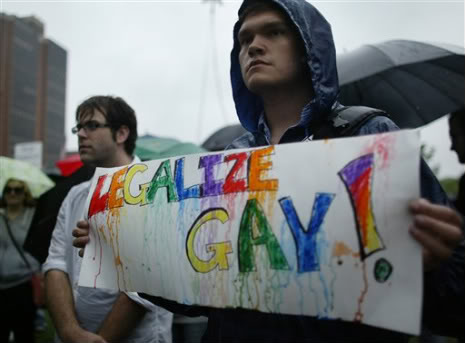
–WKW
Crossposted at William K. Wolfrum Chronicles
Eye-Opening Experiences
September 15, 2010
Some are born eyes wide open. They are the few that have an innate understanding of life from the get go. They understand love, and responsibility and the importance of others. I was not one of those people.
I suppose my eyes didn’t really start to open until I was 29. Up until then, I was the typical American boy. Stupid, self-centered, ignorant yet arrogant. I lived in the land of U.S. fantasy, where anyone could be great if they really tried and worked hard. Ronald Reagan was the greatest President ever, because my Dad had said so and I really didn’t care one way or another. I was the prototype American. I was oblivious.
It was 1996, and I was working on a fishing vessel. We were in Dutch Harbor, Alaska. I had been doing that job about four years. I was standing in a huge freezer and we were offloading the 30,000 cases of fish we had just caught.
 The freezer was open to the air, and we’d load a pallet full of cases of fish, and the ship’s crane would come down and pick it up, taking it to the dock. So for about a minute, from deep within the ship’s bowels in a freezer, I could look up and see the threatening Alaskan sky. I stood in the freezer as they craned off a pallet of fish and looked up and felt snow hit my face.
The freezer was open to the air, and we’d load a pallet full of cases of fish, and the ship’s crane would come down and pick it up, taking it to the dock. So for about a minute, from deep within the ship’s bowels in a freezer, I could look up and see the threatening Alaskan sky. I stood in the freezer as they craned off a pallet of fish and looked up and felt snow hit my face.
I was 29, I was standing in a freezer on a boat on the Aleutian Chain, and it was snowing on me. I thought of going to college for the first time. I knew something had to change.
That was Day One. That was the day my eyes finally began to open.
–WKW
An Open and Honest Conversation about My Racism
August 1, 2010
“You see, you’re one of the good Blacks,” I told my friend Al, at a high school graduation party. “It’s the bad Blacks that are the niggers.”
“I think I hate you now, Bill,” said Al, walking away.
It was 25 years ago when that scene took place, and his words still haunt me. Partly because I haven’t spoken to Al since. But mostly because that those words started me on a path toward acceptance and enlightenment that I remain on to this day.
Racism toward African-Americans was instilled into me from birth. I never got a sex talk, but I got plenty of racism lessons. And until that night, those lessons formed my opinions of African-Americans.
Being racist was an unnatural fit for me, especially since the vast majority of my experiences with Black people were positive. Al, in fact, was one of the few people who I felt close to in high school from freshman year through senior year. But mind you, my casual racist mindset was on display more than just that night. And regardless of how I got that mindset, I take responsibility for every racist word that ever came from my mouth.
Plain and simple, I was an extremely ignorant boy, swimming in his own privilege. I knew nothing of the African-American community. In fact, I knew nothing other than the limited culture of an upper-middle class white home. So while I feel I’ve never been deeply racist in my heart, I grew up being deeply racist in my mind, and thought little of it.
In the 25 years since that horrible conversation, I have had myriad experiences and travels that have helped me understand my own racism. I have learned that - while I can never fully understand a culture that I am not part of - the cultures of all minorities are a vital part to American culture as a whole.
Nonetheless, I cannot ever bury that ignorantly racist 18-year-old. He exists inside me as a never-ending lesson to myself. That boy teaches me that education and experience have helped me get on the road to becoming the man I always felt I should be. He teaches me to never become self-satisfied on issues of race. And he teaches me that the road from racism to acceptance is a road that will never end.
I am an imperfect man and I always will be. But the 43-year old writing this post has a much more open mind and much more open eyes than the 18-year-old who ended his relationship with a close friend with a racist diatribe.
This is for you, Al. Someday I hope to apologize to you face to face. But I want to thank you for your words that night, because they helped turn me around and put me on a path of acceptance and self-examination.
The path I am on today began that night, a quarter-century ago. And that path has made my life better in so many ways. Accepting and learning about the cultures and lives of other races and nationalities has made me a better husband, friend, writer and man.
So along with my apologies, I send you my thanks, Al. Because of you, I aim to create love, not hate.
-WKW
A hockey announcing career lost in the five-hole
March 12, 2010
My radio career began like many do - I walked into my college’s radio station asking about sports announcing possibilities and they said “Sure, wanna cover tonight’s hockey game?”
Thus, like most things in my life, my career as a sports announce started quickly with me having almost no grasp of what I was actually doing.
I mean, I know hockey the way the average American sports fan knows hockey. I can keep up with what’s happening on the ice. I know who’s winning and basically why. But I don’t know the lingo for the life of me. And let me tell you, from personal experience, you need to learn the lingo before you go on the air.
Now here’s something they don’t tell you - hockey’s a really fast game. Really, really fast. And here’s something they didn’t tell me - the team the fearsome University of Alaska Anchorage team would be playing a tea, made up from guys from Vick’s Vertigo Recovery Institute.
Adding up all the factors, and you see I had fallen into a dream assignment - Announcing a really fast sport I really didn’t know that well for my first time on the radio, in which one of the teams ends up scoring 18 goals.
That’s right, the final score was 18-1. You try and make that interesting. So my first experience on the radio consisted of me desperately trying to keep up with the game while finding different ways to describe the un-holy amount of goals.
Sadly, the one bit of lingo that stuck in my mind was “the five-hole.” Thus, about 11 of those goals were made through the five goal. the Vertigian goalie had a HUGE five-hole, and I filled it up with pucks, real or perceived. And honestly, I still don’t know where the five-hole actually is.
The final indignation? The fact that the engineer cut me off for the entire third-quarter. Meaning I was announcing the game (terribly) while no one was listening and no one was recording. It was totally the right thing to do.
My radio announcing career continued and got reasonably better (I was never again asked to cover hockey, and instead covered a lot of girls’ volleyball, which is a lot more fun). For the most part, I’d say that my desire to be a sportscaster was filled, much like that poor, overburdened five-hole so many years ago on that fateful night.
-WKW
Chronicles: Ambitiously Adapting in Europe, Part 1
January 22, 2010
Ambition. To have more. To have any. That’s my resolution for 2010. Just like it was for 2009. But in 2009, it wasn’t to be. Too much wound licking. Too little interest. Wanting only praise, regardless of my oft-lackluster performance. But 2009 is over and it ended well. Time to be ambitious again. Perhaps for the first time.
1.
And an hour before we leave we have a new dog. He’s a slightly sick and quite hungry puppy made up of countless other breeds of countless other dogs. Born on the street, he finds me pulling away from my house on a last-minute errand. I give him a little food and a little attention and he cries for more of both. And so now we have five dogs. We get to know him long enough for Emilia to name him – Zé Aparecido.

So, knowing little hungry Zé for just an hour or so, we leave Brazil on a family trip to Italy. My wife, her parents, her two sisters, her brother, my Dad and myself. Three weeks that will somehow be simultaneously an eternity and a flash. We’re off to Europe, leaving little Zé with four other dogs and a house sitter. We wonder if he’ll remember us when we finally return.
2.
My father meets us in Rome. He travels all the way from his home in California to spend the holidays with my Brazilian family, at the bequest of my Father-in-Law. It’s my Dad’s first Christmas since his wife, my mother, died. It’s also the year anniversary since her death. Is that what it’s called? An anniversary? Seems wrong. I feel rather disinterested in the time line, however. One day, fifty days, or three-hundred-and-sixty-five days. It’s all the same to me. I still miss my Mom. And so does my Dad.
At 70, it’s his first trip to Europe and I’m happy he’s coming. I’m happy to help do something for him during what should be a difficult time. My opportunities to help subside his grief are limited from Brazil, and even more limited due to my general disdain for the telephone and his lack of e-mail skills. So extravagant gestures are my only recourse. And this promises to be just that – aside from Italy, my father and I will make a side trip to Naila, Germany, where my grandfather was born 99 years ago. Going with my father to see his father’s fatherland. But that’s another story.
[Read more]
Chronicles: The Kindness of German Strangers
January 12, 2010
Note: This is the first effort in what I will be calling the “Chronicles” which will be essays that will hopefully create a running theme over time. There is no order for these and I have a lot of different subjects to write about, and will be delving more into myself personally, as well. This series will continue, once or twice per week, here at William K. Wolfrum Chronicles.
Chronicles: The Kindness of German Strangers
1.
My Father and I arrived in Germany 85 years after my grandfather had left. Stuck in a depressed, post-WWI Germany, my great-grandfather had left for the United State three years earlier and brought them over in 1924. After years of dallying with a related amount of dillying, my Father and I finally made the trip to see Naila, Germany, the small town (less than 9,000 residents) where my grandfather played and lived as a child. They call Naila and the surrounding area the “Bavarian Siberia,” and it didn’t disappoint. Snow to your knees, a chill in the air. Sausages lining the streets. Yes, this was Germany. We had made it back to our ancestoral homelands, and we were going to meet some long-lost family members.

Prior to our trip, we had been in contact with Hans Wolfrum, a teacher and amateur genealogist, who confirmed that many in the area were related to us one way or another. This was of particular interest to me, because in my 42 years, I’ve met very few relatives from the Wolfrum side of the family. And now here I was in Naila, the city my wife called the “Wolfrum Mecca.” Just walking down the street in Naila, I’d see Wolfrum Autohaus and Wolfrum Granite. After years of being the only Wolfrum around, I was finally surrounded by them.
[Read more]
For-profit medicine is a national sickness
July 29, 2009
When my Mom was diagnosed with leukemia, the one thing I didn’t need to worry about was the cost. My parents have long had good health insurance, and have long saved as much money as they could to prepare for the eventuality of illness. Prior to her death, my Mom received as good of treatment as she could have gotten to fight the insidious cancer that finally took her life.
Still, even though my parents had a golden parachute of health insurance and savings, there were times they even had to scrimp - especially with some of the medicines prescribed to her running in the range of $2,000 per prescription. Then they’d either purchase half a prescription, or look for a cheaper alternative.
I rest comfortably knowing that my Mom fought as hard as she could and received good medical care. At the cost of thousands of dollars out of their pockets, of course. This is what keeps me up at nights. Through my Mom’s entire ordeal, one line stuck in my mind - For-profit health care is a national illness.
As health care has taken center stage in the national dialogue, that line continues to reverberate in my mind. My parents worked their whole lives, almost solely for the purpose to afford dying. And make no mistake about it, my parents are most definitely “haves” in a nation rapidly becoming easily defined as “haves” and “have nots.”
While my Mom was living and I’d spend time with her at various hospitals, I got to hear many stories of people struggling with health care bills. Because everyone is in the same boat as my parents, but not so many have the financial wherewithal to come out of a massive medical situation without finding themselves in financial turmoil.
As President Barack Obama’s health care plan has been revised, rewritten and demonized, it has become increasingly clear that the status quo will remain. Insurance companies will be repaid for their investments in trying to kill the bill, and will continue to profit wildly. Millions and millions of Americans will continue to either be uninsured or be under-insured.
A health care reform bill will eventually be passed - Obama will make sure of that. But with insurance companies still in the mix, Americans will continue to work their entire lives to give away their nest eggs to them.
Health care in the United States is still something that angers me. Is the U.S. so determined to be a pure capitalist society that the idea of taking away ill-gotten profits from insurance companies means we’ve become socialist? Why is Universal Health care considered such a crime against humanity in the U.S.? Are we all that proud of living in a nation where the health of an American citizen solely depends on profit margin?
All I can say is that I know there is someone driving a new car, paid for by my Mom’s suffering. And that others are living in big houses with obscene bank accounts, all paid for by the sick and dying. It is obscene and inhuman.
For-Profit medicine is a national sickness in the United States. And for this, there is only one cure - single-payer. And thanks to politicians on both sides of the aisle doing their masters’ bidding, that’s not something you’ll see come out of Obama’s health care reform.
Single-payer. It is the only cure for this health care sickness. But it will never come to the U.S. as long as the few that are in charge - with pockets adequately lined - would rather the nation stays sick.
-WKW
Climbing from the hedge
December 23, 2005
It’s clearly apparent to me that someone wanted me to think about mortality in 2005.
My Godmother got hit with a vicious case of cancer that just about completely immobilized her.
Then a new friend I made in Brazil had brain surgery and nearly died afterward when his kidneys failed.
And finally my mother has been diagnosed with cancer, as well. She has already had laparoscopic surgery to remove her ovaries, which were cancerous, but now then they found more. She’ll have major surgery at the beginning of 2006, followed by chemotherapy.
It’s been just a swell time.
I really think the problem for me is that I’ve managed to spend 38 years on this planet ducking, dodging and drinking my way around anything resembling emotion.
A true story: when I was much younger, I used to go across the street from my house, where there were some hedges that I could crawl into. I was a little boy sitting in a bush so no one could see him, playing with my toys and daydreaming. I’d sit in that hedge every day for hours.
And more or less, I’ve stayed there. It’s been a lot easier to stay shielded and aloof of feelings than actually dealing with them in any way. But hiding from the important things in life is no way to live. There’s so much to think about and act on right now for me. Things are affecting all the people I care about, and my heart needs to be involved. Actively.
At 38, it’s time for me to crawl out of my hedge.
-WKW




